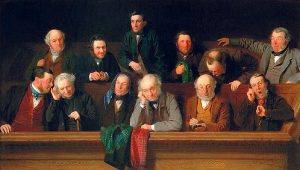Juries Are Better At This Than You'd Think
Juries get a bad rap, but lawyers should have more faith.
 Pedigreed lawyers like to look down on juries. Why would someone ever bet the company on the whims of some rubes who just want to go home? When studies come out telling us that most Americans haven’t read a book since high school, our suspicions appear confirmed. But juries are actually pretty conscientious — more so than some state judges.
Pedigreed lawyers like to look down on juries. Why would someone ever bet the company on the whims of some rubes who just want to go home? When studies come out telling us that most Americans haven’t read a book since high school, our suspicions appear confirmed. But juries are actually pretty conscientious — more so than some state judges.
Which brings us to the Kate Steinle murder trial that right-wingers are trying to turn into the injustice of the century. Steinle was undeniably killed by a gun set off by an undocumented migrant, but when the jury came in, Jose Ines Garcia Zarate was found not guilty. Trump went nuts. However, very few are pointing out that the much-maligned jury actually did their job and carefully applied the facts to the jury charges they received. Yet another reminder that juries are, generally, very good about this and if they fail to provide justice, it’s almost always a lawyer’s fault.
Phil Van Stockum, a mechanical engineer from San Francisco, served as an alternate juror on the Steinle murder trial and penned an eloquent defense of the jury based on his first-hand experience at the trial.

Legal AI: 3 Steps Law Firms Should Take Now
I was an alternate juror in the Kate Steinle murder trial in San Francisco. I didn’t get a vote, but I saw all of the evidence and the jury instructions, and I discussed the verdict with the jury after it was delivered. Most of the public reaction I’ve seen has been surprise, confusion and derision. If these were among your reactions as well, I’m writing to explain to you why the jury was right to make the decision that it did.
For lawyers, the most striking thing about Van Stockum’s account is just how laser-focused good jurors are on the law as explained to them. More evidence that jury instructions are the most important fight in any trial.
Jose Ines Garcia Zarate, the undocumented immigrant who was accused of killing Steinle, was charged with first degree murder and the lesser included offenses of second degree murder and involuntary manslaughter. When the prosecution rested its case, it seemed clear to me that the evidence didn’t support the requirements of premeditation or malice aforethought (intentional recklessness or killing) for the murder charges. After having heard the evidence, I agreed with the defense’s opinion that the murder charges should not have been brought. The evidence didn’t show that Garcia Zarate intended to kill anyone.
The murder charge always seemed like a stretch. But the prosecutors seemed to believe they could convince a jury to go along with it. Not that they were aggressively playing on perceived prejudices or anything.
Sponsored

Is The Future Of Law Distributed? Lessons From The Tech Adoption Curve

Legal AI: 3 Steps Law Firms Should Take Now

The Business Case For AI At Your Law Firm


The Business Case For AI At Your Law Firm

Manslaughter though…
But why the manslaughter acquittal? Most of the confusion I’ve encountered has been over this part of the verdict, and it does seem to me personally that manslaughter is the appropriate charge for Steinle’s killing. However, given the evidence and the law presented in this trial, it is clear to me that the jury made the right decision.
The involuntary manslaughter charge that the jury was read included two key requirements: 1) A crime was committed in the act that caused death; 2) The defendant acted with “criminal negligence”—he did something that an ordinary person would have known was likely to lead to someone’s death.
The jury members were not free to select the crime for part (1)—they had to use the one chosen by the prosecution, and the prosecution chose that crime to be the “brandishing,” or waving with menace, of a weapon. As a juror, I found this choice puzzling, because the prosecutor presented absolutely zero evidence of brandishing during the trial.
Seriously, take note of how carefully these jurors took their instructions. This is a non-lawyer writing this piece and he’s deep in nuance because he knows what the instructions told him and he was committed to following them exactly. And it appears the other jurors had the same approach.
Van Stockum’s parting words:
I have come away from this experience with a strong sense of respect for the jurors and their objective handling of a sensitive case under the national spotlight. I hope that I would have acted with the same level of maturity.
Sponsored

Generative AI In Legal Work — What’s Fact And What’s Fiction?


Navigating Financial Success by Avoiding Common Pitfalls and Maximizing Firm Performance
Lawyers should have the same respect.
I Saw the Kate Steinle Murder Trial Up Close. The Jury Didn’t Botch It. [Politico]







